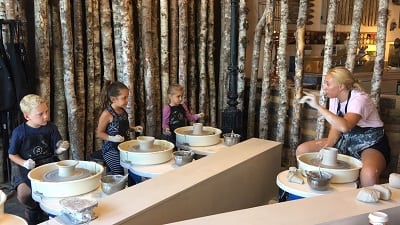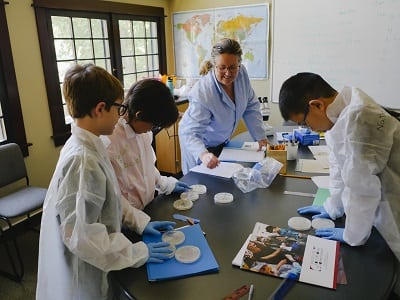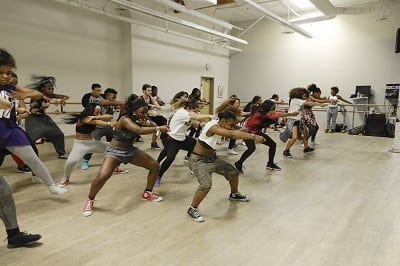
Dawn Barnes Karate Kids, with locations throughout the L.A. area, offers a martial arts program just for children. The founder says that confidence is built on experience. PHOTO COURTESY DAWN BARNES KARATE KIDS
“We can’t do Thursday, we have taekwondo.”
“But we can’t do Friday because of swim class.”
“Well, Monday is no good because of gymnastics.”
“Yeah, but Tuesday, we have Rock Band.”
This is part of a recent conversation I had trying to schedule a playdate with two other parents of kindergartners. You’ve most likely had similar talks with fellow parents, which is no surprise. From rowing to robotics, pastry-making to pottery, exciting after-school classes can be found in every corner of L.A.
This is good because trying new things is good for your kids. Studies have shown that new experiences activate the reward center in the brain while building new connections. Engaging in new activities can also help build confidence. “When students who struggle academically or socially try new activities, they can discover new talents and interests and meet new friends,” says local educational therapist Ezra Werb. “If managed correctly by parents and teachers, it can also be an opportunity for the student to work through anxieties or fears of new experiences. Ultimately, it can be a confidence boost.”
Creating Confidence
L.A. mom of two and therapist Chaka McAlpin, LMFT, witnessed these confidence-boosting benefits when her daughter got involved with her school’s cheer team. “During the last year, she was the team captain,” says McAlpin. “She is not the most outspoken child. However, this role still highlighted her strengths. It improved her confidence and taught her she can accomplish anything with hard work.”
Dawn Barnes, founder of SoCal-based Dawn Barnes Karate Kids, says she has also seen that exposing kids to a variety of experiences is key. “When we meet a child who is too shy to try a karate class, it’s often because they’ve never tried any type of class before.” Barnes says. “So, what’s the cure for shyness? We believe that confidence is built on experience. The more kids try something new, the easier it will be to try something new.”

At Bitter Root Pottery studios, children as young as 6 get to try their hand throwing pottery on a wheel. PHOTO COURTESY BITTER ROOT POTTERY
With so many potential brain-enriching, confidence-boosting, skill-building class options to pick from, how does a parent begin to choose? “When choosing an enrichment class for your child, it’s helpful to ask yourself: Will the class help my child expand and improve upon an existing interest? Or will the class expose my child to a whole new interest that may help them grow in a positive new way?” suggests enrichment consultant Jami Hollis Wagner, who teaches fifth grade at Turning Point School in Culver City.
Also take into consideration personal interests, learning styles and scheduling. “Parents should balance all the child’s existing activities and pressures from school and performance-based activities with something that gives the child a chance to be just that – a child,” says local clinical psychologist Jennifer Noble, Ph.D. “This will allow the child to form various questions, search for their own answers and make some powerful discoveries.”
Subjective Self-Discovery
Self-discovery is the mission of Bitter Root Pottery, a ceramics studio with locations in Woodland Hills, West Hollywood and Valencia. Getting messy is all part of the road to creativity. “After all, there are no mistakes in art,” says pottery teacher and assistant manager Megan Kepple. At Bitter Root, kids as young as 6 can take a turn throwing clay on a wheel, creating bowls, decorations or sculptures.
But creating tactile art is about more than just the end result. “Since art programs have been taken away from so many schools, I believe taking a ceramics enrichment program is important for all children to fulfill this basic need to express themselves, to make an individual well-rounded,” says Kepple. “We live in a world now where we are almost all technology or screens, all the time. A ceramics class allows kids to get back to their core and use a medium of art that has been around for as long as we’ve roamed this planet.”
Trying new things is part of the artistic process. “Art classes are great because they’re so subjective,” says Kepple. “If we have kids working on creating self-portraits out of clay, and one student decides to make their portrait look like a cat, nobody can say that the student is ‘wrong’ because that’s who she feels she is. I feel like Bitter Root is very lucky to have so many teachers with the mentality that children are amazingly uninhibited and genuinely creative.”
Finding a Fit
The Institute for Educational Advancement (IEA) in Pasadena specializes in putting students in a creative environment where they can thrive. This extracurricular academy for gifted students in kindergarten through eighth grade teaches STEM and humanities subjects through intriguing classes such as “Star Wars: A Hero’s Journey,” “CSI: Forensic Science” and my personal favorite, “King George: What Was His Problem?”

At the Institute for Educational Advancement, students learn STEM and humanities subjects in creative ways. PHOTO COURTESY INSTITUTE FOR EDUCATIONAL ADVANCEMENT
Mia, a 12-year-old IEA student, often felt restless at school, bored with uninspired lessons and the disruptive behavior of fellow students. She noticed that her classmates at IEA Academy are “way more energetic and open” because they enjoy learning. After all, who wouldn’t enjoy learning about the justice system by participating in a mock trial or figuring out Newton’s laws of motion by building a miniature roller coaster?
Determining a student’s learning style helps the staff at IEA figure out which courses to recommend. “At IEA, our main concern is fit,” says staff member Nicole LaChance. “Parents should consider the needs of their child. Do they have a passion for a certain subject? “Will they thrive in a small class or do they like larger group settings? What is their learning style? Once the ideal learning environment is determined, parents should evaluate programs based on that list.”
Matching Their Style
Another important part of choosing new activities for your child to try is figuring out how your child processes new skills. “If parents are aware of how their kids learn best, they can suggest activities for their kids that suit their cognitive profile,” says Werb. “Kids tend to be drawn to activities that complement their own learning styles. Some kids learn better through visual means, some learn better by hearing information and others learn better kinesthetically, when their bodies are moving.”

For kids who learn best through movement, Debbie Allen Dance Academy offers a wide range of classes. PHOTO COURTESY DEBBIE ALLEN DANCE ACADEMY
Debbie Allen Dance Academy (DADA) in Baldwin Hills offers dance and movement classes ranging from ballet to African, hip-hop, modern and jazz that teach kids ages 4-18 new ways to move. Emmy Award-winning actress, dancer and choreographer Debbie Allen founded the academy with the idea of forming a new generation that could speak the language of dance anywhere in the world. “Access to the arts and enrichment classes builds creativity and helps children develop critical thinking and problem-solving skills that will serve them well throughout their lives,” says spokesperson Kim Hale.
The academy is also looking to expand this access with a new scholarship for boys ages 9-15. “Research shows that girls outnumber boys 25 to 1 in dance programs throughout the U.S.,” Hale says. “DADA’s goal is to change that statistic by providing opportunities for young men and boys to benefit from all that dance has to offer.”
Trial, Error and Balance
Whether your kids choose to learn dance, pottery, science or swimming, trying new things will also help them develop a sense of self-awareness. “Part of the beauty of trying new things is the child gets to see what they do and don’t like,” Noble says. “They begin to learn where their passions lie, where their natural talents exist, and which of those passions and talents they want to explore further.” Finding out what your kid doesn’t like is also part of the process, and trial-and-error is an excellent tool for developing self-understanding.
Balance is another necessary tool. So, remember to balance your child’s new activities with down time so they have a chance to process all these new experiences. “It’s really important not to overschedule children as a great deal of learning takes place through open and unstructured play,” says Wagner.
In other words, after taekwondo, Rock Band and gymnastics, remember to take time to relax together as a family … and to keep those playdates.
Anyone have a Thursday afternoon open?
Risa Williams (risawilliams.com) is a native Angeleno, mom, writer, university professor and therapist.


























